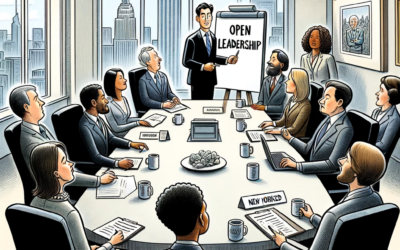The penguin’s natural predator is the leopard seal. Penguins feed on fish and they must enter the water to feed. It is there that the leopard seals hunt the penguins, especially when they are alone. There must always be a first among the team of penguins who is willing to initiate the dive into the water. Going first is very risky in the life of a penguin, because they will be alone if only for a moment. It is in that moment that the leopard seal will find his/her dinner. Because of the risks involved, the penguins function as a team. The first one leads and the others do a kind of ritual dance to signal their readiness to jump in together soon after the first one dives in to the water. They jump together because they are much safer being together than they are swimming alone. Just as it is dangerous for the lead penguin to go first it can be equally hazardous for the penguin that goes last. Jumping in together is not only about working together it is about surviving.
This behavior is not new to human organizations. Nachshon, according to the Book of Exodus and the Jewish Midrash, initiated the parting of the red sea by walking into the sea before it parted. His name is synonymous with being an initiator.
Today’s organizations can’t afford to sit on their past accomplishments. They need to look at leadership risk. Nor can the leaders leading them. It is easy to become comfortable with playing it safe and not initiating new ideas that have a great deal of risk to you as the leader. Just as important is the ability as a leader to make it safe for others to lead and take risks. It may be your courage to allow others to take risks that demonstrates your leadership. Nachshon was not the leader of the Jewish slaves out of bondage, that was Moses’ role. And yet it was Nachshon that initiated the parting of the Red Sea by entering the sea first. Some biblical scholars say this is what prompted God to split the seas. God was waiting for the people to initate a solution before s/he would intercede.
Professor Randy Pausch from Carnegie Mellon who wrote The Last Lecture used to give “The First Penguin Award” to those in his class who took the biggest gamble in trying new ideas or technology. Are you rewarding gambles within your organization, or are your words, values, tones, and behaviors keeping greatness bottled up?
How are you as the lead penguin – do you find yourself taking additional risks for the team to safeguard them against the hazards of the free market system? This could be simply protecting your team from the hazards of internal corporate politics or the natural forces of competition. Are you willing to take the high risk of asking the unpopular questions in uncomfortable settings? If you own the business, or have made it to the top of the hierarchical pyramid, are you still pushing as hard as you did in the early years against the status quo? What is the leadership risk you’re taking? Being a leader within a team, organization, market, or industry is risky business and you will need to weigh out your leadership risk. The good news for you is that it is a lot safer, most of the time, in our organizational life than it is for the lead penguin. Perhaps it is time to try giving away “The First Penguin Award” in your company.



